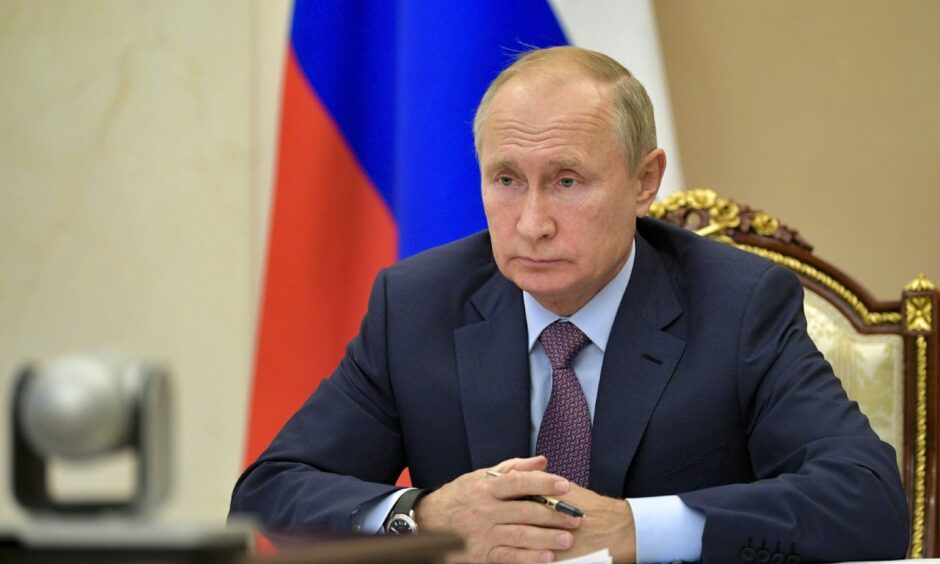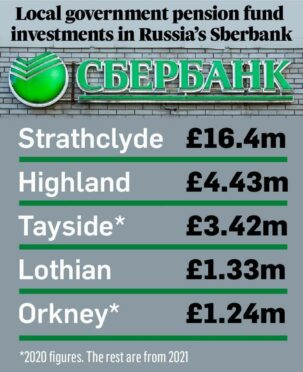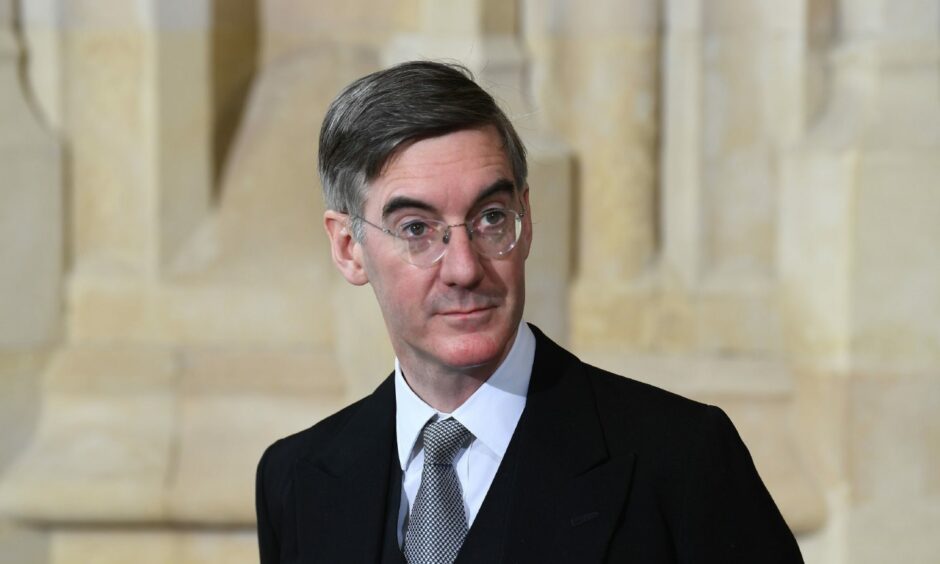A Tayside public sector pension pot could disinvest its £3.4 million holding in a sanction-hit Russian bank in the wake of Vladimir Putin’s shocking invasion of Ukraine.
Dundee City Council, which administers the local government pension fund for the region, confirmed to The Courier that the investment in Sberbank was being “actively reviewed”.
The Tayside fund is one of several Scottish public sector pension schemes with a combined total of more than £26m tied to the bank.
Sberbank is Russia’s biggest lender and is majority owned by Putin’s government.
Recent figures show Strathclyde had holdings worth £16.4m, while Highland had £4.43m, Lothian had £1.33m and Orkney had £1.24m.
The bank’s European subsidiaries were facing failure on Monday with a run on deposits and sanctions imposed by western powers in response to the attack on Ukraine, which began last week.
The local government pension fund investments in Sberbank emerged just a day after an investigation showed the Scottish Parliamentary Pension Scheme has holdings worth £299,571 in the Moscow-based lender.
Asked about the future of the Tayside pension fund investment, a Dundee City Council spokeswoman said: “The pension fund currently holds shares in Sberbank via an investment manager who is charged with making all investment decisions.
“We are unable to comment on plans to buy or sell individual holdings but can confirm that the holding is being actively reviewed by the investment manager.”
The Local Government Pension Scheme in Scotland holds assets worth more than £45 billion.
It serves more than 236,000 active members, more than 140,000 deferred members and more than 169,000 pensioners and dependents.
Employers participating in the Tayside Pension Fund include Angus Council, Dundee City Council, Dundee & Angus College, Perth & Kinross Council, Perth College UHI, as well as non-uniformed Police Scotland and Scottish Fire & Rescue Service staff.
‘Crucial moment in history’
Scottish Labour external affairs spokeswoman Sarah Boyack said it is time to “stand firm” and “stamp out” the influence of Russian finance.
“Pension funds must break these ties and divest as a matter of urgency,” she said.
Meanwhile, Holyrood presiding officer Alison Johnson announced she had written to the Scottish Parliamentary Pension Scheme (SPPS) trustees, asking them to disinvest all Russian shareholdings.
Pauline McNeill MSP, chairwoman of the trustees, in turn wrote to fund managers Baillie Gifford to request that it divests immediately from Sberbank and all other Russian companies.
In light of the Russian invasion of Ukraine, I have written to the Trustees of the Parliament’s pension scheme urging that all Russian shareholdings are divested immediately.
You can read my letter in full at https://t.co/dpzQTy2uds pic.twitter.com/E2nqHdoaJI
— Alison Johnstone (@POScotParl) February 28, 2022
Holyrood parties had earlier demanded action.
Green MSP Ross Greer said: “I cannot fathom why the Scottish Parliament Pension Fund has holdings in Sberbank in the first place.
“But, in light of the Russian invasion of Ukraine it is clearly inappropriate for that to remain the case.
“Some trustees of the fund have resisted ethical investment policies for too long but I’m sure most MSPs and former MSPs will want this urgently addressed and Sberbank immediately divested from.”
The Trustees agreed in March 2021 that all future pensions contributions would be invested in a sustainable, ethical fund.
Tory minister Jacob Rees-Mogg’s investment firm previously had shares in Sberbank worth £44.5 million, but they were sold off as the Ukraine crisis ramped up.
A Scottish Parliament spokesman previously said: “The trustees agreed in March 2021 all future pensions contributions would be invested in a sustainable, ethical fund that excludes companies that contravene UN principles on human rights, labour, the environment and anti-corruption.
“The SPPS invests in pooled funds with Baillie Gifford. It is one of a number of investors in the funds, therefore beyond these ethical conditions, the trustees cannot direct Baillie Gifford in their investment strategy.”



